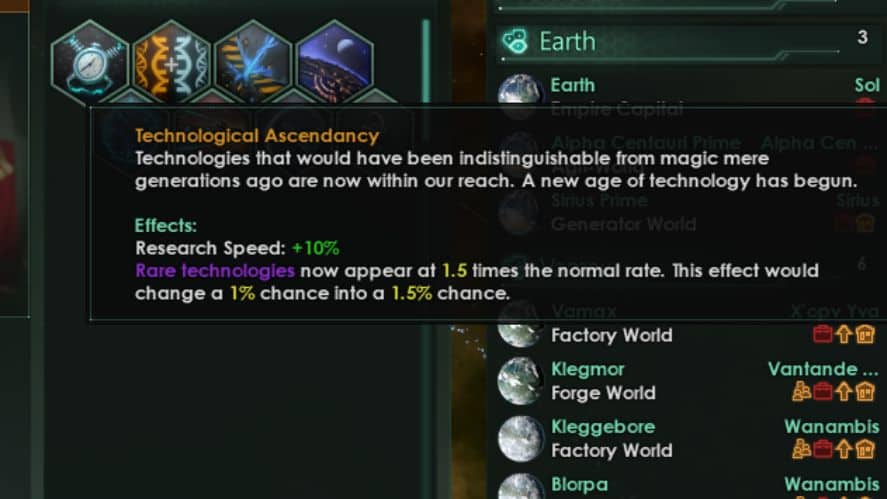When building an empire in Stellaris, you have a lot of choices in the direction you can take your empire. You can be a devouring swarm consuming all life in the galaxy; right through the spectrum to a one-planet pacifist empire.
Of all the paths you can take, none is more mysterious than the psionic path. Taking the psionic path leads to some great game mechanics and powerful buffs to your empire.
Recommended Read: How to Use the Quantum Catapult in Stellaris
Contrary to popular belief, psionics are not only for spiritual empires. Any empire, even materialists, can unlock psionic theory. The only exception is your empire cannot be a Gestalt consciousness.
Psionic Theory is a rare technology in the society research tree. There are no prerequisites to get it, except you cannot be a Gestalt consciousness. Also, materialists must have psionic pops or leaders to have a chance at unlocking it.
Table of Contents
How to get Psionic Theory in Stellaris
If you are really lucky, you may be offered the chance to get Psionic Theory in the early game. Unfortunately, the odds of this happening are pretty much zero.
Unlocking the psionic potential of your empire can have far-reaching consequences. Consequences that can determine the fate of the entire galaxy.
What is Psionic Theory
Before choosing the path of the psychic, you should understand what you are getting yourself in for.
Psionic Theory is a research option available in the society research tab. It is a rare technology, so the base chances of receiving the option to unlock it are slim.
When researched, your empire begins to unlock its latent psionic potential. Your leaders may receive bonus traits, and you can unlock the Mind over Matter ascension perk.
Unlocking Mind over Matter is the first step to taking the psionic ascension path, but that is a different guide all in itself.
If you do take this path, you should know that it can lead to some of the strongest technology upgrades in the game. They include Psionic Shields, Psi Jump Drives, Telepathy, Psionic Armies, Zro Distillation, and even the power to contact the mysterious Shroud.
How to get the Psionic Theory Research Option
With Psionic theory being a rare technology, you have to be a little lucky to get it. If you play the game long enough, you will eventually get the option. Obviously, we want the option as soon as possible, and there are a few ways to improve our chances.
The best method is to stack as many rare research chance buffs as we can. Some of these buffs are very easy to acquire, and others are not.

Here is a list of all the ways toys to improve your chances of rolling the Psionic Theory tech:
- The Technological Ascendency ascension perk. This perk is a must-take for almost any empire. The 50 percent increase in rare technology is almost too good to pass up.
- Assign a scientist leader who has the Spark of Genius trait. This trait provides a bonus to unlocking rare technologies. The game’s tooltips do not provide an exact number, but any amount is better than no amount.
- Recruit a scientist from a Curator Enclave. If you have 50+ opinion with a Curator enclave, you can hire a high-level scientist from them. These scientists always have the Curator trait. This trait provides a bonus to rare technology unlocks.
- If you can assign a researcher that already has any psionic traits. Psychic scientists have a high chance of drawing Psionic theory. This is the only way to unlock the trait if you are a materialist empire.
- If your empire is any form of spiritualist, you get a much higher chance of drawing this tech.
With all these modifiers, you can unlock the Psionic Theory tech early and start your empire’s psychic adventure.
That is everything you need to know about how to get Psionic theory in Stellaris.
If you have any questions or suggestions for this guide, please leave a comment below. Good luck out there.




